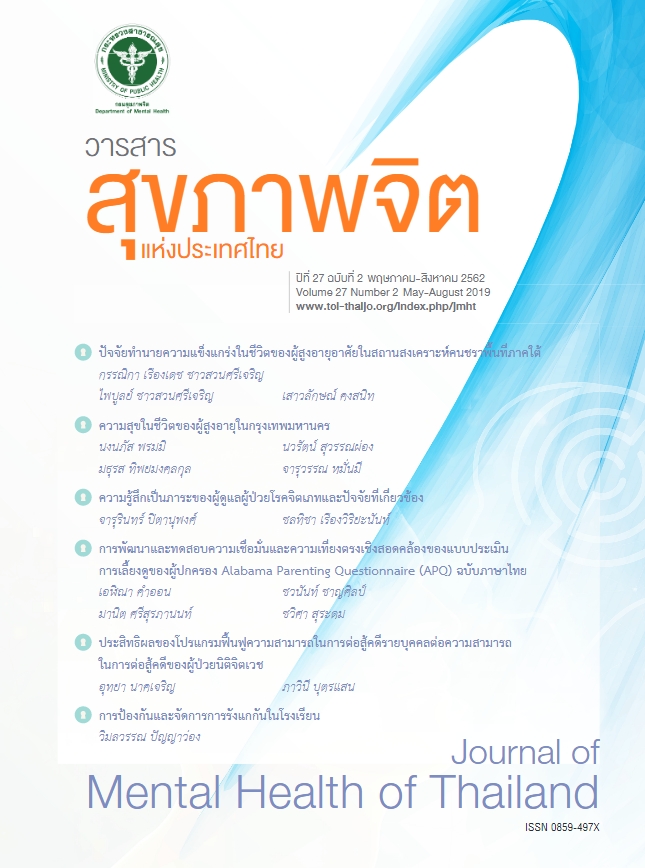ประสิทธิผลของโปรแกรมฟื้นฟูความสามารถในการต่อสู้คดีรายบุคคลต่อความสามารถในการต่อสู้คดีของผู้ป่วยนิติจิตเวช
คำสำคัญ:
ความสามารถในการต่อสู้คดี, ผู้ป่วยนิติจิตเวชบทคัดย่อ
วัตถุประสงค์: เพื่อศึกษาผลของโปรแกรมฟื้นฟูความสามารถในการต่อสู้คดีรายบุคคลต่อความสามารถในการต่อสู้คดีของผู้ป่วยนิติจิตเวช
วิธีการ: เป็นการวิจัยกึ่งทดลอง (quasi–experimental research) กลุ่มตัวอย่าง คือ ผู้ป่วยนิติจิตเวชที่ถูกนำตัวส่งมารับการประเมินทางนิติจิตเวชตามประมวลกฎหมายวิธีพิจารณาความอาญามาตรา 14 จำนวน 20 คน คัดเลือกกลุ่มตัวอย่างตามคุณสมบัติที่กำหนดโดยแบ่งออกเป็นกลุ่มทดลอง และกลุ่มควบคุมจำนวนเท่าๆ กันโดยวิธีจับฉลาก สำหรับกลุ่มทดลองได้รับการฟื้นฟูความสามารถในการต่อสู้คดีตามโปรแกรมจำนวน 4 ครั้ง ส่วนกลุ่มควบคุมได้รับการปฏิบัติกิจกรรมตามปกติ เครื่องมือที่ใช้ในการวิจัยประกอบด้วย แบบบันทึกข้อมูลทั่วไป โปรแกรมฟื้นฟูความสามารถในการต่อสู้คดีรายบุคคลที่ผู้วิจัยสร้างขึ้นตามแนวคิดความสามารถในการต่อสู้คดีของ Dusky ร่วมกับการทบทวนวรรณกรรมที่เกี่ยวข้อง และแบบประเมินความสามารถในการต่อสู้คดีที่ผู้วิจัยพัฒนาขึ้น วิเคราะห์ข้อมูลโดยใช้ใช้สถิติ Independent t-test และสถิติ Pair t-test
ผล: พบว่าภายหลังการทดลอง กลุ่มทดลองมีคะแนนเฉลี่ยความสามารถในการต่อสู้คดีสูงกว่าก่อนทดลองอย่างมีนัยสำคัญทางสถิติ (p< 0.05) และมีคะแนนเฉลี่ยความสามารถในการต่อสู้คดีสูงกว่ากลุ่มควบคุมอย่างมีนัยสำคัญทางสถิติ (p< 0.05)
สรุป: ควรตระหนักและให้ความสำคัญกับการฟื้นฟูความสามารถในการต่อสู้คดีของผู้ป่วยนิติจิตเวช โดยจัดอบรมให้ความรู้และสนับสนุนให้นำโปรแกรมฟื้นฟูความสามารถในการต่อสู้คดีรายบุคคลไปใช้ในการฟื้นฟูความสามารถของผู้ป่วยนิติจิตเวชให้ไปต่อสู้คดีได้เร็วยิ่งขึ้น
Downloads
เอกสารอ้างอิง
2. Crocker A, Eizner-Favreau O, Caulet M. Gender and fitness to stand trial assessments: A five-year review of remands in Québec. Int J Law Psychiatry. 2002;25:67-84.
3. Zapf PA, Roesch R. Fitness to stand trial: Characteristics of fitness remands since the 1992 Criminal Code amendments. Can J Psychiatry. 1998;43:287-93.
4. Bertman LJ, Thompson JW, Water WF, Estupinan-Kane L, Martin JA, Russell L. Effect of an individualized treatment protocol on restoration of competency in pretrial forensic inpatients. J Am Acad Psychiatry Law. 2003;31:27-35.
5. Nicholson RA, McNulty JL. Outcome of hospitalization for defendants found incompetent to stand trial. Behav Sci Law. 1992;10:371-83.
6. Stafford KP, Wygant DB. The role of competency to stand trial in mental health courts. Behav Sci Law. 2005;23:245-58.
7. Mossman D, Noffsinger SG, Ash P, Frierson RL, Gerbasi J, Hackett M, et al. AAPL practice guideline for the forensic psychiatric evaluation of competence to stand trial: an American legal perspective. J Am Acad Psychiatry Law. 2007;35:S3-72.
8. Advokat CD, Guidry D, Burnett DMR, Manguno-Mire G, Thompson JW Jr. Competency restoration treatment: differences between defendants declared competent or incompetent to stand trial. J Am Acad Psychiatry Law. 2012;40:89-97.
9. Wortzel H, Binswanger IA, Martinez R, Filley CM, Anderson CA. Crisis in the treatment of
incompetence to proceed to trial: harbinger of a systemic illness. J Am Acad Psychiatry Law. 2007;35:357-63.
10. Morris DR, DeYoung NJ. Psycholegal abilities and competence restoration of competence to stand trial. Behav Sci Law. 2012;30:710-28.
11. Anderson SD, Hewitt J. The effect of competency restoration training on defendants with mental retardation found not competent to proceed. Law Hum Behav. 2002;26:343-51.
12. Brown D. A didactic program for persons found unfit to stand trial. Hosp Community Psychiatry. 1992;43:732-33.
13. Noffsinger SG. Restoration to Competency Practice Guidelines. Int J Offender Ther Comp Criminol, 2001;45:356-62.
14. Siegel AM, Elwork A. Treating incompetence to stand trial. Law Hum Behav. 1990;14:57-64.
15. Carbonell JL, Heilbrun K, Friedman FL. Predicting who will regain trial competency: initial
promise unfulfilled. Special issue: psychopathology and crime. Forensic Reports. 1992;5:67-
76.
16. Ladds B, Convit A, Zito J, Vitrai J. Involuntary medication of patients who are incompetent to stand trial: a descriptive study of the New York experience with judicial review. Bull Am Acad Psychiatry Law. 1993;21:529-45.
17. อุทยา นาคเจริญ เบญจวรรณ สามสาลี สุลี ตังกุ พรรณยุพา เจ็งไพจิตร และ เกศรียา คณาธรรม. ผลของ
โปรแกรมกลุ่มเตรียมความพร้อมในการต่อสู้คดีต่อความสามารถในการต่อสู้คดีของผู้ป่วยนิติจิตเวช
[Effects of competency to stand trial group program on competency to stand trial among
forensic psychiatric patients. Bangkok]. วารสารสภาการพยาบาล. 2552;24:24-35. Thai.
18. Gutheil TG. Forensic psychiatry. In: Kaplan, H.I., & Sadock, B.J. (Eds.). (6th). Comprehensive
textbook of psychiatry/VI. Maryland: Williams & Wilkins; 1995.
19. Bonnie RJ. The competence of criminal defendants: a theoretical reformulation. Behav Sci Law. 1992;10:291-316.
20. Grisso T. Pretrial clinical evaluations in criminal cases: past trends and future directions. Crim Justice Behav. 1996;23:90-106.
21. Mueller C, Wylie AM. Examining the effectiveness of an intervention designed for restoration of competency to stand trial. Behav Sci Law. 2007;25:891-900.
22. Dawes SE, Palmera BW, Jeste DV. Adjudicative competence. Curr Opin Psychiatry. 2008;21:490–4.
23. Scott CL. Commentary: A road map or research in restoration of competency to stand trial. J Am Acad Psychiatry Law. 2003;31:36-43.
24. Siegel AM, Elwork A. Treating incompetence to stand trial. Law Hum Behav. 1990;14:57-64.
ดาวน์โหลด
เผยแพร่แล้ว
รูปแบบการอ้างอิง
ฉบับ
ประเภทบทความ
สัญญาอนุญาต
- ผู้อ่านสามารถนำข้อความ ข้อมูล จากวารสารไปใช้ไปใช้ประโยชน์ทางวิชาการได้ เช่น เพื่อการสอน เพื่อการอ้างอิง แต่การนำไปใช้เพื่อวัตถุประสงค์อื่น เช่น เพื่อการค้า จะต้องได้รับอนุญาตเป็นลายลักษณ์อักษรจากกรมสุขภาพจิตก่อน
- ความคิดเห็น ข้อมูล และบทสรุปต่าง ๆ ที่ลงตีพิมพ์ในวารสารสุขภาพจิตแห่งประเทศไทยเป็นของผู้เขียนบทความและมิได้แสดงว่ากองบรรณาธิการหรือกรมสุขภาพจิตเห็นพ้องด้วย




